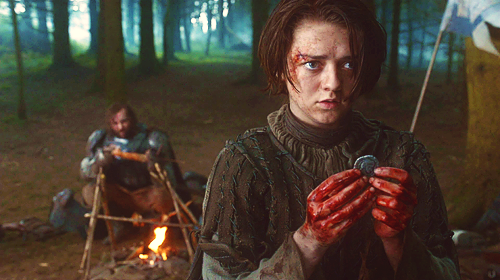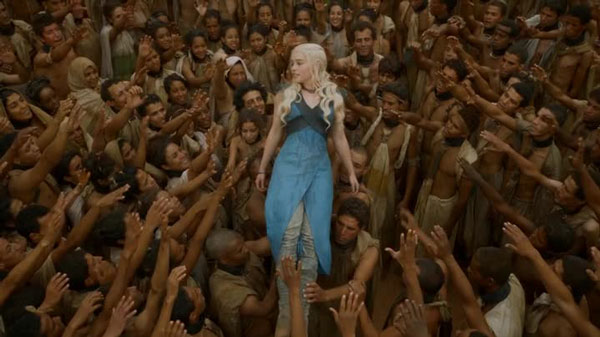Well, that was a harrowing ten hours, was it not? What more is there to say, really? Tyrion’s still the fan favorite, Joffrey’s still a dickwheel, and yes, we know that the Red Wedding made you cry a gnashing Narrow Sea’s worth of tears.
So we’ve lived through the guttural, emotional, raw experience of the season fresh, or not so fresh depending on how often you’ve read and re-read the books in preparation for each premiere, and the time has come to reflect.
In the wake of “Mhysa” (which sounds like I’m talking about a hurricane of some sort, which is appropriate) there are a few things to be considered.
The Red Wedding and You
After the utter madness that was the reaction to “The Rains of Castamere,” the season finale seems like something of an exhalation. This appears to be a routine that Game of Thrones is setting up: delivering a surprising ninth episode that results in fandom chaos (see: the death of Ned Stark, the battle of Blackwater, and now the Red Wedding), and then allowing us a tenth episode to take a breath, while at the same time it sets the stage for what’s to come in the following year.
Season three was no different: it created a need for some sort of resolution in the season finale, only to defer any possible payoff until the next season. That said, even knowing that this was the intent, the Red Wedding seemed a little harsh. Perhaps that’s the point, though. It’s a reminder that, despite the dragons and fire gods and wargs and wights, the world of Game of Thrones is still emotionally grounded in reality. Betrayal breeds bitter hate and people will go above and beyond to be brutal and nasty and awful to one another to feed their own selfish impulses.
But that’s life, isn’t it? Why do we need the reminder? Probably because Game of Thrones is not wish fulfillment. George R.R. Martin has created a world with some very serious, very dire issues and I’m not only talking about the zombie army marching south to mutilate everything you hold dear (which isn’t fun. Not even a little. Ask Theon Greyjoy). Sexism, racism, classism, we’re looking at an archaic world mired in backwards values that can be aggressive in offending our sensibilities.
However, that doesn’t mean that the world is utter shit. In any number of fantasy novels, the wedding of Edmure Tully and Roslin Frey would have been a sign of old wounds forgiven, it would have signaled an alliance between the Starks and the Freys and would have resulted in Robb Stark riding triumphant against Casterly Rock, eventually taking vengeance on the Lannisters for the death of his father. And it would have been easy, which is precisely why it isn’t happening here.
Robb wounded Lord Frey’s pride, which we know is something not taken lightly in Westeros, and in the end he paid a far more dire price than he deserved. The Red Wedding is a reminder that in Game of Thrones victories are things won after long, agonizing struggles or not at all. Something tells me that Daenerys Targaryen might be running low on the victory fuel she earned the first two seasons and might soon learn this lesson as well.
Another facet of the Red Wedding is that it makes the small spots of hope we see in the series shine brighter. Moments like Yara Greyjoy defying her father and setting out to retrieve her brother or Sam leaving Bran and his companions a bevy of dragonglass daggers hit harder because the darkness of the series can be so oppressive. It’s that age-old proverb of the light needing the dark to shine brighter, and it’s a reminder that while those small victories are so hard-won, they still seem as though they’re worth it.
It’s About Power
If nothing else, this season has been a meditation on power in Westeros and Essos, the places it can be found, and the ways various sources of power can be used and manipulated.
Tywin Lannister preaches power in family; Varys and Littlefinger show us power in information (something tells me that with a T1 connection those two would be running the continent in a week); we’ve seen demonstrations of violent physical power, domineering psychological power, and even the power of reassurance and persuasion. In terms of demonstration, Orell, Locke, and Ramsay Snow are our best barometers for seeing the way to power in Westeros. The key to power, for them, is profound self interest and brutality, it’s the only road they see to whatever fleeting happiness they can hope to achieve. We can see more than a few shades of this at play in the actions of Tywin and Joffrey as well. As Littlefinger opines, all that matters is the climb.
However, season three has shown us that this is not true. We have characters like Tyrion, Daenerys, and Varys acting with humanity, and while oppressed, while set about on all sides by the profound darkness of the world around them, still they fight. The Hound saves Arya Stark after Robb’s death, though there’s clearly no more material gain in the girl’s well-being for him. Whatever the reason, saving her life was a human act. As I mentioned before, it’s the small moments of conscience that seem the most important.
This season has been emotionally draining, to say the very least. With the threat of Winter in Westeros looming ever closer, the question of power, how to acquire it, and how to keep it may soon become moot as survival itself slowly becomes more and more questionable. With the White Walkers continuing their glacial (pardon the pun) trek further south, there may come a time where the kind of power that comes from political manipulation is far less desirable.
At the moment, however, Margaery’s road to power might be the most efficacious. For now, the person with the most power is still going to be the one best at playing the game.



